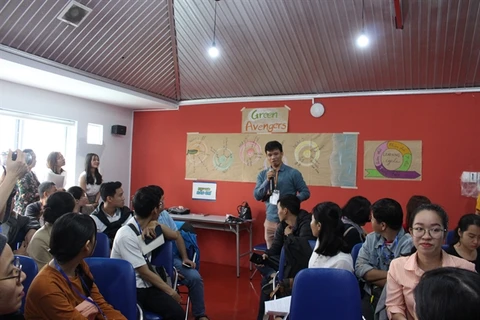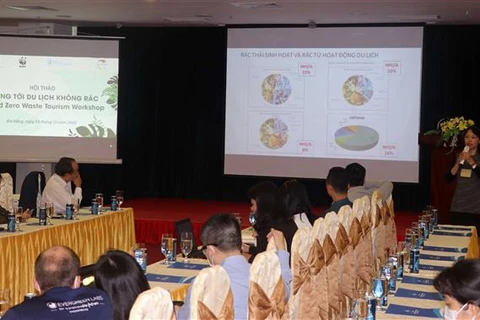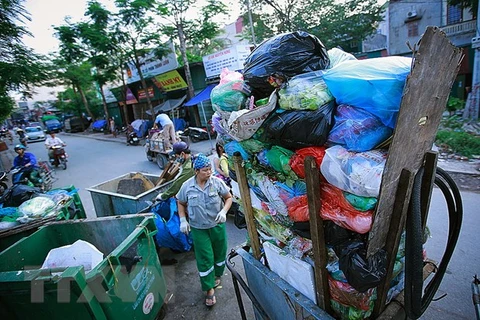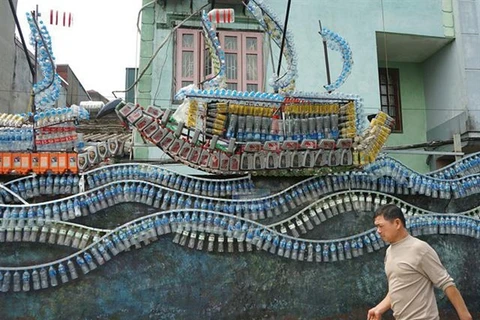Hanoi (VNA) – Cooperation in waste management and the building of emission-free circular economy was highlighted at the third meeting of the Joint Committee of Vietnam’s Ministry of Natural Resources and Environment (MoNRE) and Japan’s Ministry of the Environment on March 10.
According to the Vietnam Environment Administration under the MoNRE, Vietnam has faced a number of new issues in the collection of fees for domestic solid waste gathering, transport and treatment, and the roadmap for the reduction of production and import of goods having microplastic components.
Vice Director of the administration Nguyen Thuong Hien said that in 2021, in order to support the implementation of the Law on Environmental Protection 2020, Japan's sharing of experience in waste management and implementation of other relevant regulations is very necessary, especially those related to managing solid waste and criteria in choosing urban and rural domestic waste treatment technologies and models, and the collection of fees for domestic solid waste gathering, transport and treatment.
According to the Vietnam Environment Administration under the MoNRE, Vietnam has faced a number of new issues in the collection of fees for domestic solid waste gathering, transport and treatment, and the roadmap for the reduction of production and import of goods having microplastic components.
Vice Director of the administration Nguyen Thuong Hien said that in 2021, in order to support the implementation of the Law on Environmental Protection 2020, Japan's sharing of experience in waste management and implementation of other relevant regulations is very necessary, especially those related to managing solid waste and criteria in choosing urban and rural domestic waste treatment technologies and models, and the collection of fees for domestic solid waste gathering, transport and treatment.
The Ministry of Environment of Japan agreed to continue cooperation and share information with Vietnam on the building of relevant standards and criteria as well as the building of legal documents in preventing, sorting, transporting, recycling and treating of waste.
Japan can support Vietnam by sending its experts to Vietnam to help in building and reviewing guiding documents on the implementation of the Law on Environmental Protection 2020.
In the coming time, the two sides will soon hold a video conference to clarify issues related the building of circular economy to protect the environment.
Vietnam proposed that the Japanese side continue to implement works related to the intensive research for economic tools in managing domestic solid waste to contribute to building the circular economy, thus assisting Vietnam in designing decrees and circulars to guide the implementation of the law.
Japan can support Vietnam by sending its experts to Vietnam to help in building and reviewing guiding documents on the implementation of the Law on Environmental Protection 2020.
In the coming time, the two sides will soon hold a video conference to clarify issues related the building of circular economy to protect the environment.
Vietnam proposed that the Japanese side continue to implement works related to the intensive research for economic tools in managing domestic solid waste to contribute to building the circular economy, thus assisting Vietnam in designing decrees and circulars to guide the implementation of the law.
Hideki Wada, a Japanese expert, said that the Japanese side has chosen the two localities of Bac Ninh and Binh Duong for support.
In Bac Ninh, the supporting activities include making region-based planning on waste management, controlling targeted waste through waste sorting at source and building plans for waste management with pilot models in a commune, he said.
Meanwhile, Japan will help Binh Duong control targeted waste like it does in Bac Ninh. However, with difficulties facing the southern province in waste treatment, Japan will help the province in making a pre-feasibility study for a waste-to-power project and estimating risks of the project, he added.
He said that currently, the two localities are working with advisory agencies to make a report on specific necessary support activities to submit to the Japan’s Ministry of the Environment./.
In Bac Ninh, the supporting activities include making region-based planning on waste management, controlling targeted waste through waste sorting at source and building plans for waste management with pilot models in a commune, he said.
Meanwhile, Japan will help Binh Duong control targeted waste like it does in Bac Ninh. However, with difficulties facing the southern province in waste treatment, Japan will help the province in making a pre-feasibility study for a waste-to-power project and estimating risks of the project, he added.
He said that currently, the two localities are working with advisory agencies to make a report on specific necessary support activities to submit to the Japan’s Ministry of the Environment./.
VNA
























